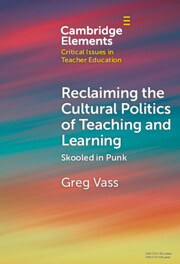Element contents
Reclaiming the Cultural Politics of Teaching and Learning
Published online by Cambridge University Press: 09 May 2024
Summary
Keywords
- Type
- Element
- Information
- Online ISBN: 9781009303460Publisher: Cambridge University PressPrint publication: 23 May 2024
References
- 4
- Cited by

